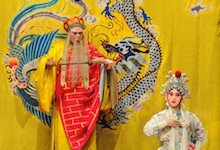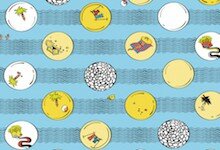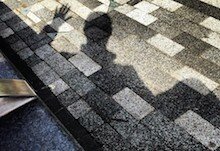Interview with Vivian Smith
Michael Brennan: When did you start writing and what motivated you?
Vivian Smith: I began writing poetry at the age of fourteen or fifteen and was soon sending poems to the Bulletin, whose literary section was edited by Douglas Stewart and Ronald McCuaig. It was some years before I got anything published but they used to send back occasional comments – I remember Stewart writing that poeticisms like “o’er” and “’twas” would not do in a modern poem – far too old-fashioned – this was the 1940s in Australia. Finally I had some poems accepted just before I left the Hobart High School.
At first I think I was motived by a sense of fun. I liked the sounds words made. I greatly admired Edith Sitwell’s Façade and its setting by William Walton, which seemed so excitingly modern with its extraordinary images and rhythms and verbal patterns. Later I discovered the surrealists, and a teacher who was in charge of the Hobart High School Literary Society lent me a copy of the Ern Malley issue of Angry Penguins. This would have been in 1948/9. So everything was rather turbulent and wild to begin with –and perhaps it has gone on like that, only in different ways. The Eliot of the ‘Preludes’ I discovered at High School along with Pound’s In a station of the metro, some D.H. Lawrence pieces and Hopkins’ ‘Pied Beauty’. Dylan Thomas made an enormous impression when I started at university.
MB: Who are the writers that first inspired you to write and who are the writers you read now? What’s changed?
Vivian Smith: The writers who first inspired me to write were a very mixed bunch and included novelists as well as poets. I have always been interested in Australian poetry and was probably much influenced by the writers appearing in the Australian journals at the time. Elizabeth Riddell, Roland Robinson, David Campbell, Judith Wright, Ray Mathew – all the so-called Bulletin poets of the 1940s and 50s – had an impact on me. Later I started to get to know the work of James McAuley and A.D. Hope and Kenneth Slessor. I think writers go on learning all their lives. I was caught up with modern languages at high school and quickly got to know various French and German poems. Baudelaire, Rimbaud, much later Mallarmé; Rilke, Trakl, Hofmannsthal remained touchstones. I got to know the Americans: Stevens and the poets of his time, and of course the English: Auden, Spender, MacNeice, David Gascoyne. Yeats seems to have been there from the beginning. I have always read voraciously across the centuries and across cultures. In recent years German poetry has become more and more important to me, especially Paul Celan and Hans Magnus Enzensberger. It is extraordinary that he has not yet received a Nobel Prize. But as far as my reading goes I wouldn’t say that much has changed.
MB: How important is ‘everyday life’ to your work?
Vivian Smith: Everything. I cannot live without it. All my poems have their point of departure in some everyday event or feeling – whether it is walking across a park in Paris and seeing a group of statues put out for cleaning or reading some item in the newspaper, or thinking of or remembering some event or person.
MB: What is the function or place of subjectivity in your poetry?
Vivian Smith: I am not sure that I understand this question. I think that everything depends on our psychology but that is something we write from or out of not what we aim at. I would like my poems to be there like a Cézanne apple rather than like a Tanguy midscape. Subjectivity determines tone, approach, structure, subject matter, everything about a poem. A Shaw Neilson lyric is different from a Slessor lyric – except in quality and value – and I suppose both poets’ subjectivity determines what that difference is.
If I understand the question, it is not something I can talk about easily. It is like asking me about the way I speak or the way I walk. I just have to take these things for granted and get on with my work.
MB: Do you see your work in terms of literary traditions or broader cultural or political movements.
Vivian Smith: The short answer to this is no. These are questions for critics or literary historians rather than for a poet like me. The fact is that much about my own writing and the working of my own mind remains quite mysterious and puzzling to me. I am frequently surprised at the way my own mind works when I notice it doing something unexpected or unbidden. When I am writing I am only concerned with the poem in hand, with getting it right and true.
The question you ask really concerns a much later stage of reading my work. Some time ago I noticed that I had written – had been writing – a number of poems concerned with Australian colonial life and experience which obviously stem out of my life in Tasmania and growing up in an old colonial port, but these poems simply grew and developed, they were not consciously planned and organised. I did not deliberately start out to write a sequence about colonial life in the way some poets take up topics and work them into a series – or the way some poets construct a narrative around a set of historical events. My poems simply grew across the years and perhaps they now constitute a set or series but they did not start out that way. Nevertheless they are deeply involved in some of the broader cultural changes that have occurred in Australia over recent years even though they did not set out to illustrate them.
The political question is more difficult. I have always been opposed to police states, totalitarian regimes and threats to individual freedom. I remember years ago, at the time of the Whitlam dismissal, going to a meeting in the Paddington Town Hall – called Poets for Freedom or something like that – at which my old friend Roland Robinson was reading. I went to support the event and show solidarity. There was a lot of indignation and some rant from some of the poets and a deal of doggerel. Roland’s poem wasn’t bad: he had tried to construct some symbolic allegory out of the recent events but it was not one of his best efforts either.
The only deliberately political or protest poem I have written is ‘Looking Back’ which came in the middle of the prosperous and affluent eighties. I was horrified at the materialism, pretentiousnss, greedy prosperity and complacency of the time. I had just visited Ben Chifley’s house at Bathurst, and I knew Joe Lyons’ house at Stanley. I wanted to call my poem ‘Australia’ and remind people of another time, another place, but that didn’t quite work – and the poem came out the way it did. Once you publish something you have no control over the way it will be read or understood and I must say that I have been surprised at some of the responses it has received.
On the whole I am skeptical about the value of protest poems and overtly political pieces though there have been some great political poems. Yeats and Brecht and some of the central European poets of the Cold War years spring to mind.
There is nothing that poetry cannot do in the hands of a master. I recently read the life of the Greek poet George Seferis and was struck by how much he was enmeshed in the history and politics of his country and of how different his life was from that of any of his Australian contemporaries. Australia is indeed another country.
MB: What aspect of writing poetry and working as a poet is the most challenging?
Vivian Smith: I have always had to work for my keep and teaching seemed to offer the best solution for someone of my temperament, but teaching is a full-time job and it makes enormous demands on time and energy and writers need a lot of time for day-dreaming and musing.
Teaching “creative writing” was not an option in my time. People now have no idea how restricted the opportunities were for Australian writers of my time: grants were very few in number and the present day circuit of festivals and launches and readings and so on did not exist.
The main challenge as always is to get your poems written. It is surprising how often a poem can get away – just disappear – before you get it down.
The present publishing situation in Australia is difficult. Angus & Robertson who published my earlier books used to bring out a fine series A&R Poetry Classics and A&R Modern Poetry but they have disappeared. Fortunately new publishers have arisen who take on poetry: Giramondo, Puncher and Wattmann, Vagabond, Black Inc and several others – but Angus & Robertson went a long way back in Australian literary history.
MB: What reading, other than poetry, is important to your work as a poet and why?
Vivian Smith: As I said in reply to question 2, I have always read voraciously and widely and everything I read – from newspapers to billboards – is grist to the mill.
MB: What is ‘Australian poetry’? Do you see yourself as an ‘Australian’ poet?
Vivian Smith: Australian poetry is poetry written by poets born here or settled here who are pleased to be called Australian poets. It is not just poetry written about Australia. I am sure that Matt Simpson would not have called himself an Australian poet even though he lived in Tasmania for a time. Is Auden an English or an American poet? Is Peter Porter an English or an Australian poet?
MB: Don Anderson once described Australian poetry as Australia’s only “blood sport”. More recently critics have seen Australian poetry in terms of a “new lyricism” (David McCooey) and “networked language” (Philip Mead). What is the current state of play in Australian poetry? How do you think Australian poetry and discussions about Australian poetry might best develop in the next ten years?
Vivian Smith: I am old enough to have become wary of topics like these, whether academic or journalistic, and I always try to steer clear of them. I can remember when I was very young A.D. Hope wrote a polemical piece about Australian poetry being a “vast geographical cliché”, and over the years I have read any number of opinion pieces: ‘Is Australian writing worth reading’, ‘Does Australian literature have a future’, and so on. These summaries have their place and significance but they always make me think of all the good writing and writers we have – their intelligence and sensitivity and stylishness – so I reach for my Slessor or Judith Wright or A.D. Hope or think of Shaw Neilson and Joseph Furphy and Marcus Clarke and of how lucky we are to have writers with qualities like these.
A culture without a living memory is a dead and stagnant thing and there is a danger of getting stuck on an arid present or a bewildering future and forgetting how much we have to be thankful for. I believe that everything in poetry depends on individual talent and that we need to do all we can to foster that talent and not stifle it.
MB: How is poetry relevant or valuable to contemporary society and culture in Australia or at an international level?
Vivian Smith: Poetry matters to poets and devoted poetry readers – and it matters in some countries more than in others – but I don’t think it matters all that much to most of the world, not in the way that painting and music and theatre do. But a good new book adds something to our being and makes us see the world in a new way. It enhances our sense of being alive.








